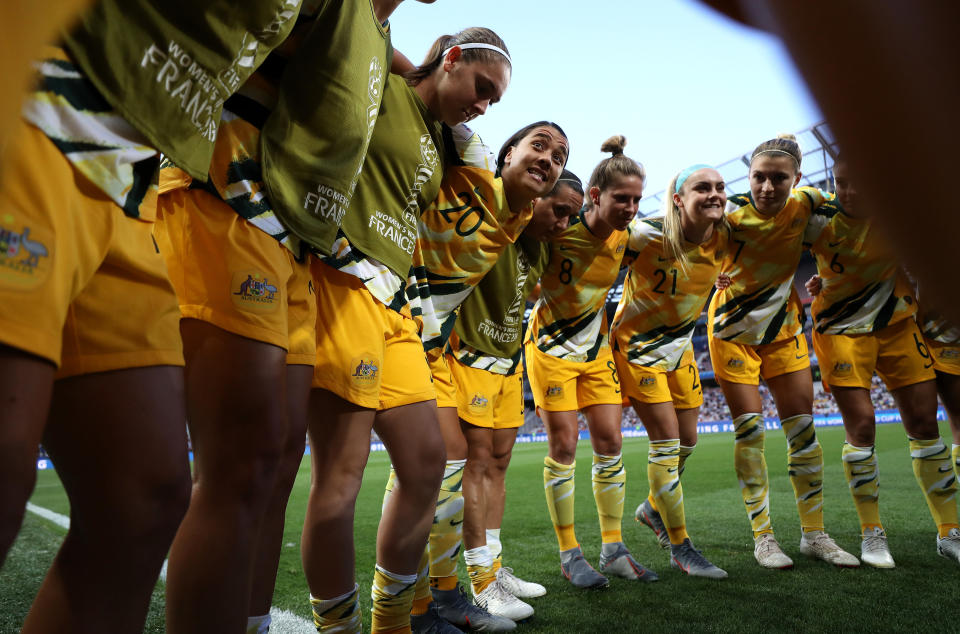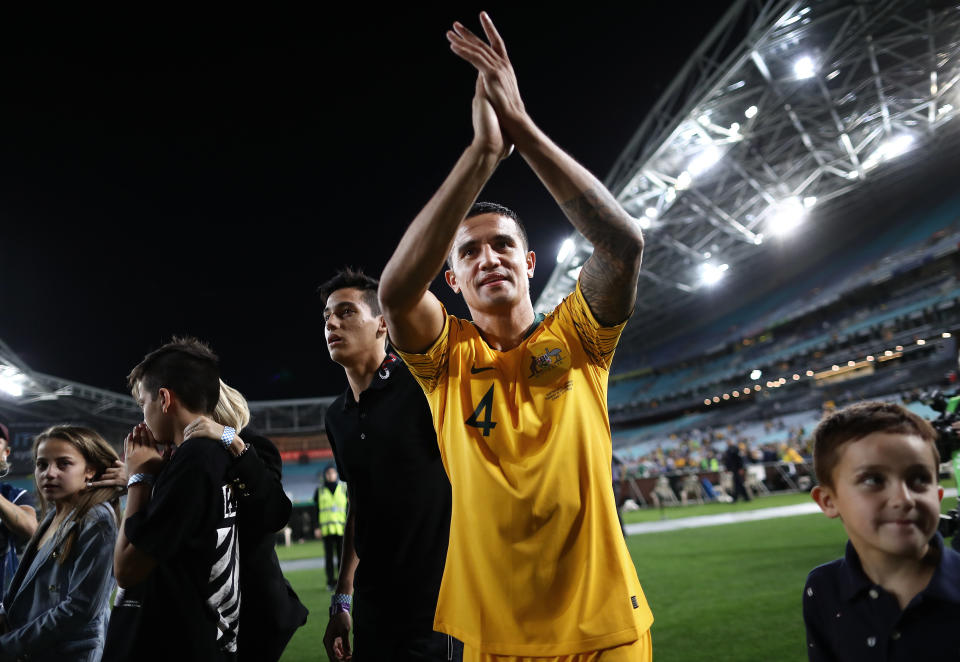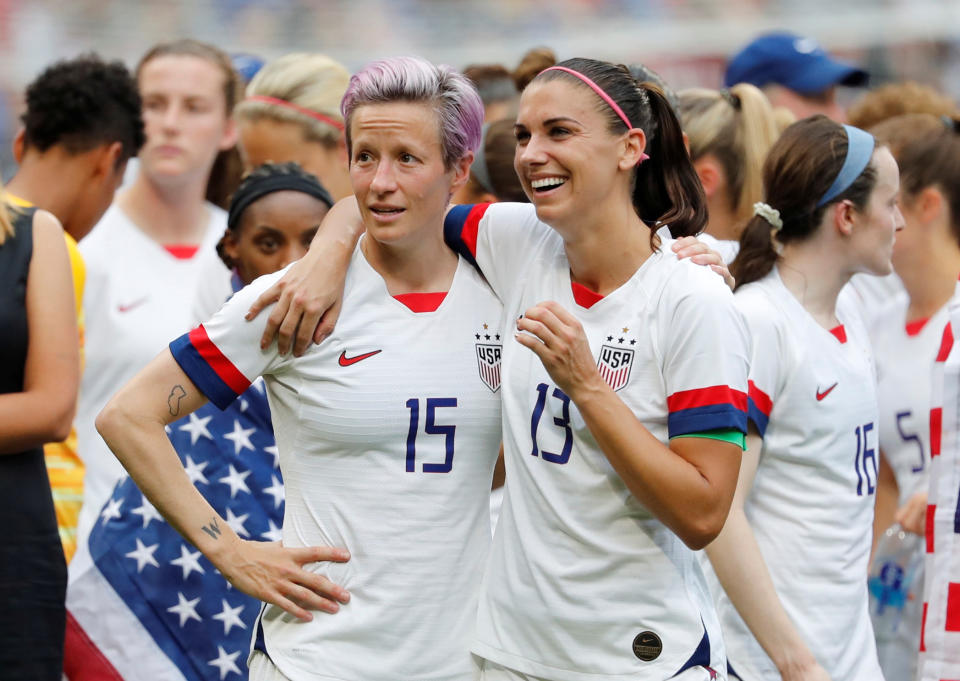What the USWNT can learn from Australia's equal pay deal

While the U.S. women's national team continues a decades-long battle with the U.S. Soccer Federation over alleged wage discrimination, Australian soccer has been making headlines for a very different reason.
The men's and women's national teams of Australia just approved a new collective bargaining agreement that offers equal pay across the board, down to the cent. It has been hailed as a groundbreaking step for equality in soccer, and yet the representatives who helped negotiate the deal tell Yahoo Sports it wasn't the Herculean task it may seem.
“In the end, it really wasn’t tough,” says Kathryn Gill, the deputy CEO of Professional Footballers Australia, which negotiated the deal. “Everyone involved is incredibly proud of what we've achieved.”
It's not as if the Matildas, as the Australian women's team is known, didn't butt heads with their federation. Four years ago, the Matildas boycotted a pair of sellout games against the USWNT and publicly accused their federation of disrespecting them.
So how did the situation go from boycotts to equal pay? And how can the USWNT and U.S. Soccer learn from what happened Down Under?
What equal pay looks like in Australia
The Matildas’ boycotts, which were taken directly from the playbook of the USWNT in the 1990s and 2000s, worked in getting the attention of not just the Australian federation, but the country at large.
“It was the catalyst that changed the way women's sports were treated in Australia, if I'm honest,” says Gill, a former player.
When Professional Footballers Australia, the union for the Matildas and the men's national team (known as the Socceroos), began looking at each team's next contract, gender equality was atop the priority list.
“Our starting point was we didn’t want gender equality to be the men's standards dropping,” says PFA CEO John Didulica. “We wanted it to be about elevating the standards of the women's program, and that took a lot of work to design a model that was affordable yet didn’t compromise on delivering high performance for the women in line with what the men had been receiving.”
It helped that the Socceroos quickly supported the idea without the need for a hard sell. (In fact, USWNT goalkeeper Ashlyn Harris called out the USMNT’s lack of vocal support last week.) They saw the upside of supporting the Matildas and uniting with them, Didulica says.
But achieving equal pay meant scrapping the previous model of agreeing to fixed salaries and appearance fees from the Australian federation.

The PFA developed a new revenue-sharing model, where the national teams would equally share about a quarter of the federation's player-generated revenue. The money would be distributed via different structures the men and women set, but the amount of money available would be exactly the same, and the top-paid Socceroo would earn the same as the top-paid Matilda to the cent.
The deal is a “leap of faith,” Didulica says, but it puts the players firmly in control. If the teams perform well then revenues will grow, the teams can capture the upside, and everyone will win.
“Before, there was a winner and a loser,” Didulica says of the old model of fixed wages. “If the federation overperformed, the players got a lower share. If the federation underperformed, the game suffered because the players would be paid a disproportionate amount.”
The new collective bargaining agreement goes beyond compensation, though.
The men and women will receive the same business-class or five-star travel accommodations. Each team will also be required to have the same number of full-time staff and resources available to players.
Commercial opportunities between the two teams will be made equal as well.
Nike, for instance, has in the past offered bonuses to the Socceroos if they qualify for the World Cup – but not for the Matildas. Now, this new CBA requires that the current deal between the Australia federation and Nike will need to be renegotiated so the Matildas can earn bonuses as well.
What the United States can learn
While parties involved in Australia's landmark deal insist it was easy in the end, the difficult part stateside is understanding how it could translate to the USWNT, if at all.
One key difference is that in Australia, the men’s and women’s national teams are part of a single players union, the PFA, and negotiate together. Previously, that single union still had separate contract negotiations for the Socceroos and the Matildas, but it wasn't much of a stretch to have the two teams negotiate side by side with the same union reps.
For a similar equal pay agreement to be achieved in the U.S., the USMNT and the USWNT would need to join forces and leverage their collective value rather than try to compete against each other in pleading their cases to U.S. Soccer. Right now, that seems to be the biggest roadblock, even if it could help both teams.
Didulica compares it to the famous negotiations between NBC and the cast of the hit sitcom Friends. The ensemble cast took the unusual step of negotiating as a collective unit, resulting in not just equal pay for each of the show's six stars, but massive pay bumps that eventually reached $1 million per actor per episode and set records.
“They knew collectively they'll be far more successful than just one of them,” he says. “If Phoebe dropped off or Joey dropped off, the show wouldn’t be the same. … Christian Pulisic standing next to Alex Morgan would be a really powerful image.
“Here, we felt the teams together were far stronger and presented a far more reflective image of Australia rather than two teams separate," he adds. "The teams create a far more powerful commercial and social force together, and I see no reason why the U.S. wouldn’t be able to adopt a similar model.
“It's not just about more leverage – the value proposition is far stronger if they're negotiating together because the story you tell is a lot richer.”
There are other reasons that the Australia process might not translate to the U.S., however.

The Australian agreement is considered so groundbreaking in large part due to its commitment to equal commercial opportunities. Other teams have offered equal salaries, such as Finland, but the Australian deal is equal on more fronts.
In the U.S., however, the commercial side of the national team business has been shifting. While some rights are still controlled by U.S. Soccer, the USWNT wrestled back its rights to team licensing and merchandising to launch its own business, something the USMNT probably has no interest in doing and would rather let U.S. Soccer control.
Prize money is another thorny issue.
In Australia, equality was achieved by giving the Socceroos and Matildas equal percentages of their own prize money that they win – a meager 50 percent compared to what the U.S. teams get – but the USWNT might not be willing to overlook that. That's because FIFA offers vastly different prizes for the men's and women's World Cups, enough to skew each team's pay significantly, despite the fact that the USWNT has enormous pressure to win tournaments while the men face the lowest of expectations.
The PFA union in Australia has opted to put public pressure on FIFA to fix the massive gap in prize money, but it won't make up for the differences in prize money out of its own pockets.
“We'll keep lobbying on that from afar, but we just didn’t think it was fair to pool prize money,” Gill says.
Can the USWNT achieve what Australia has?
In reality, the equality Australia achieved in soccer may not be able to be copied and pasted for the United States. But that also probably isn't necessary. While there are specific issues U.S. Soccer would need to work out with its national teams, the approach and the end goal can still be identical to Australia, the PFA reps say.
Asked what advice he’d offer to the U.S. teams, Didulica urges everyone to look at the unique opportunity the sport brings. Soccer is arguably the only team sport in the U.S. where the men's and women’s version of the game commands the same attention and excitement, and the game is played the exact same way, making both genders’ versions immutably connected.
“Soccer in the United States continues to be a step out of the mainstream, so the dynamics of it are very similar to Australia – it has its loyal constituencies but it hasn’t been fully embraced within the mainstream,” he says. “What football can do that no other sport can is put men and women on the same pedestal that exists in boardrooms and wherever else in society men and women stand equally. Football can deliver that.
“It is such a powerful point of difference that soccer can create from other sports in the U.S. where that's never going to happen. In football we have this unique opportunity to stand side by side, and we're the only team sport that can do that. A country like the U.S. should embrace that. It would make it such a powerful force, not just financially but socially, too.”
Caitlin Murray is a contributor to Yahoo Sports and her book about the U.S. women’s national team, The National Team: The Inside Story of the Women Who Changed Soccer, is out now. Follow her on Twitter @caitlinmurr.
More from Yahoo Sports:

